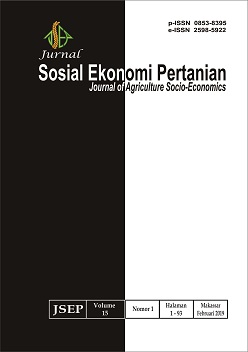ANALISIS DAMPAK KEPEMILIKAN MODAL SOSIAL TERHADAP KEBERLANGSUNGAN INDUSTRI KECIL DI RUMAH MAKAN NISWA
Isi Artikel Utama
Abstrak
The research purposes 1) Analyzing the social capital used by a business owner. That’s seen in social capital forms; bonding social capital, bridging social capital, and linking social capital. 2) Knowing the social capital ownership impact against the sustainability of small industry in niswa’s restaurant. The selection of research locations was conducted deliberately with consideration of the restaurant as a kind of a restaurant run by some family members in Salatiga and is a form of bonding social capital. It uses a qualitative method with descriptive design. A collected word or text information, then analyzed and interpreted to capture the deepest meanings. Studies have found that three important social capital forms like bonding, bridging, and linking together are linked and complementary ones Bonding social capital forms can be seen through the support of family members, even Key Informant could motivate his sons to join the business. The bridging social capital is the most dominating forms, as it placed the horizontal line. While linking social capital, indeed, doesn’t seem to have much influence in this research, because the owner has very little connection with vertical relationships, however, Key Informant still has ties to the banking system for acquiring capital.
Rincian Artikel
Referensi
Adinda, F. 2015. Tahu Serasi Dalam Perspektif Modal Sosial (Studi Sosiologi Peran Modal Sosial Pada Tahu Serasi di Bandungan, Kabupaten Semarang). Universitas Kristen Satya Wacana Salatiga.
Alfiasari., Hadi Dharmawan, A., & Martianto, D. 2009. Modal Sosial dan Ketahanan pangan Rumah Tangga Miskin di Kecamatan Tanah Sereal dan Kecamatan Bogor Timur, Kota Bogor. Jurnal Sodality, 3.
Hasbullah. 2006. Social Capital (Menuju Keunggulan Budaya Manusia Indonesia). Jakarta: MR United Press.
Herdiyansah, H. 2010. Metode Penelitian Kualitatif untuk Ilmu-ilmu Sosial. Jakarta: Salemba Humanika.
Humaira, R. 2011. Peranan Modal Sosial Dalam Pengembangan Nilai-Nilai Kewirausahaan. Institut Pertanian Bogor, Bogor.
Lawang, R. 2005. Kapital Sosial dalam Perspektif Sosiologik. Depok: FISIP UI Press.
Moleong, J. L. 2000. Metodologi Penelitian Kualitatif. Bandung: PT. Remaja Rosdakarya.
Pandi. 2016. Peran Modal Sosial Terhadap Keberlangsungan Usaha Pedagang Burjo Di Salatiga. Universitas Kristen Satya Wacana, Salatiga.
Putnam, R. D. 1995. Turning In, Turning Out: The Strange Disappearance of Sosial Capital in America. Political Science and Politics, 28.
Sugiyono. 2011. Metode Penelitian Kuantitatif, Kualitatif, dan R & D. Bandung: Alfabeta.
Woolcock, M. 2003. Social Capital. Thousand Oaks: Sage.

